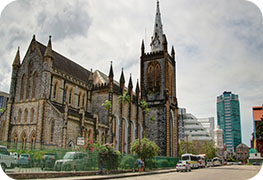Everything You Need To Know About A Trinidad and Tobago Visa
 The
Caribbean islands of Trinidad and Tobago follow a lenient visa policy, allowing
nationals of 101 countries to enter their borders without a visa. Luckily, the
United Kingdom also falls under the list of visa-exempt nations.
The
Caribbean islands of Trinidad and Tobago follow a lenient visa policy, allowing
nationals of 101 countries to enter their borders without a visa. Luckily, the
United Kingdom also falls under the list of visa-exempt nations.
If
you hold an official British passport, you can gain entry into Trinidad and
Tobago without a visa. You can stay in the country for a period of 90 days per
visit, within a 180-day period. If you wish to extend your stay, you can apply
for an extension to the Passport and Immigration Department, in Port of Spain,
Trinidad and Scarborough Tobago.
Documentation requirements to gain entry into Trinidad and Tobago without a visa
Passport requirements
You should note that the government of Trinidad and Tobago follows the International Civil Aviation Organisation (ICAO) requirements, as applicable from November 2015. This implies that you must possess a machine-readable passport and present it at the points of entry and exit, in order to be allowed admission inside the nation.
Additionally, your passport should be valid for a minimum period of six months from your date of entry into the country. It should also contain at least two blank visa pages for necessary stamping during arrival and departure.
Additional requirements
You must also possess a valid return or onward ticket to your home country or to your next destination. Remember to carry all the required documents that grant you entry into the subsequent country on your itinerary
Ensure that you have valid documentation to prove that you hold sufficient funds to cover your stay in Trinidad and Tobago during the said stay period
It is also advisable to carry evidence which specifies your purpose of the trip. Since the visa-exemption facility is only available for tourism, business, and transit purposes, it is necessary that you are able to verify your intentions before the immigration officials.
Finally, make sure that you read the transit requirements for all the nations in your travel plan. If there are overseas air-transits, you might need an individual transit visa. Moreover, contact your airlines if they allow boarding without a visa. Sometimes, rules change without any prior intimation and you do not want to face unwelcome surprises after you arrive at the airport.
For any other doubt, feel free to contact the Government of the Republic of Trinidad and Tobago’s Immigration Division website.
Visa requirements for official travel
As we already mentioned, the visa-free regime is applicable only when you are traveling to Trinidad and Tobago for purposes related to leisure, business, or air-transit. For other purposes, you might need to apply for a visa through the embassy before you embark on your trip.
For instance, if you are traveling for official purposes, you need to have a visa. However, the good news is, you can obtain a visa on arrival after you land at the airport.
The documentation needed is similar to that of a visa-free entry. All you need is:
- A machine-readable passport, having a minimum validity of six months and at least two blank pages
- Proof of onward or return airline tickets
- Sufficient funds to cover your stay in Trinidad and Tobago. You can present this in the form of bank statements or cash
- Evidence which describes the purpose of your trip
- Necessary documents for the next destination
Once you arrive at the airport, head to one of the immigration kiosks located on its premises. Present your documents. The immigration officer will verify your documentation, alongside your stated purpose. If everything is in order, he/she will stamp a VOA on your passport.
UK Emergency Travel Documents
In the unlucky event that you lose your passport or it is damaged/stolen while you are inside Trinidad’s borders, you can apply for UK Emergency Travel Documents. ETD’s are accepted for entry, airside transit and exit from the nation.
Yellow fever certificate requirements
You should note that certain regions of Trinidad and Tobago do have a risk of yellow fever transmission. Therefore, it is highly recommended that travelers above 9 years of age get a vaccination if they plan to travel to the thickly wooded areas within the island. However, a vaccination is not mandatory if you are on a cruise ship or air transiting through the country.
According to the International Health Regulations, you additionally require a yellow fever vaccination certificate if your travel itinerary includes a trip through countries with risk of yellow fever transmission. It is also mandatory when you have transited for more than 12 hours through an airport of a country with risk of yellow fever transmission.
Custom regulations and local laws
The government of Trinidad and Tobago follows strict rules when it comes to illegal activities such as drug trafficking.
If you are found engaged in such activities, you can face severe penalties. Marijuana or cannabis is totally a no-no and you can be held in custody. The authorities conduct a thorough check of your luggage upon arrival.
As per local laws, same-sex/LGBT sexual activity is still considered illegal in Trinidad and Tobago. The legislation even bans members of the LGBT community from entering the nation (though it is never implemented practically).
Additionally, it is considered offensive if anyone is found carrying or dressing up in camouflage clothing.